Book Launch Seminar Held for “Forced Migration and Humanitarian Action: Operational Challenges and Solutions for Supporting People on the Move”
2025.04.02
The book launch seminar for “Forced Migration and Humanitarian Action: Operational Challenges and Solutions for Supporting People on the Move” was held on Jan. 30, 2025, bringing together experts, researchers, and practitioners to discuss key findings from the book. The book results from a three-year project, “Research on the Evolving Humanitarian Action for Forced Migration,” conducted by the JICA Ogata Sadako Research Institute for Peace and Development (JICA Ogata Research Institute). It examines diverse forced migration scenarios with an emphasis on vulnerable groups including children, women, people with disabilities, older people, and migrant workers. Moderated by Muto Ako, Specially Appointed Research Fellow, JICA Ogata Research Institute, the seminar featured presentations by the book’s editors and contributors, highlighting different aspects of forced migration and humanitarian action.
Orita Tomomi, Principal Research Fellow, JICA Ogata Research Institute, opened the seminar by emphasizing the increasing complexity of forced migration. The Office of the United Nations High Commissioner for Refugees (UNHCR) estimates that by the end of 2024, more than 120 million people worldwide will be forcibly displaced due to persecution, conflict, violence, human rights violations and events that seriously disrupt public order. Orita underscored that forced migration is a critical human security issue and that humanitarian actors are providing assistance to diverse populations and adapting to different forced migration scenarios. She expressed hope that the book’s findings will bridge the gap between research and practice, ultimately improving humanitarian response efforts.
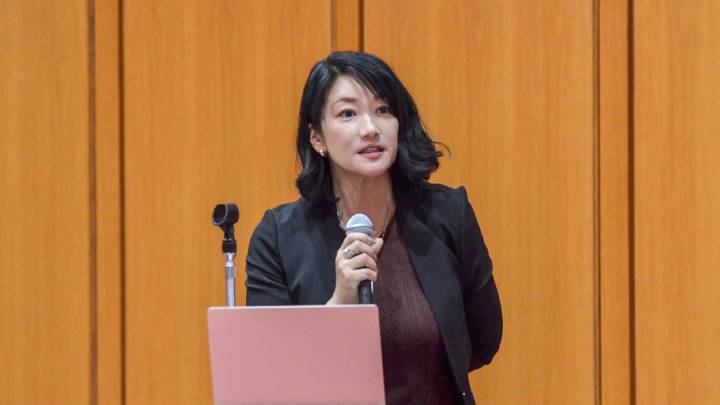
Orita Tomomi, Principal Research Fellow, JICA Ogata Research Institute
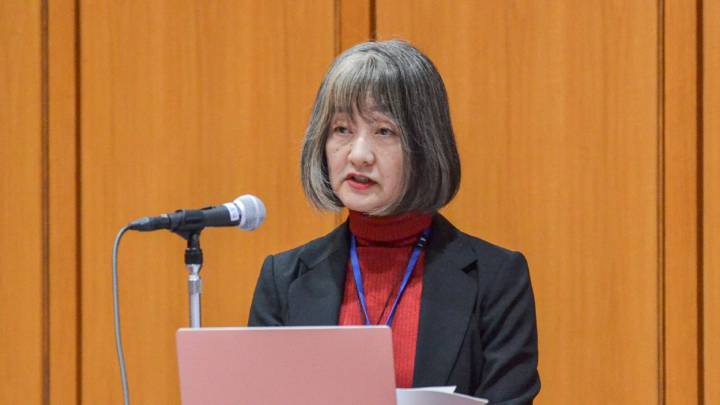
Muto Ako, Specially Appointed Research Fellow, JICA Ogata Research Institute
Lorenzo Guadagno, co-editor of the book and Programme Manager, Platform on Disaster Displacement, provided an overview of its key themes. He highlighted that forced migration is a defining feature of crises, shaping how humanitarian actors respond to displaced populations. He cited recent examples such as Ukraine, Gaza, and natural disasters to illustrate the different contexts of forced displacement.
A key concept discussed in the book is vulnerability, which varies across different displaced groups. Guadagno explained that vulnerability is not an innate characteristic but is shaped by structural factors, including social, political, and economic conditions. The book explores how humanitarian responses can be adapted to meet the needs of different groups, from addressing accessibility concerns for people with disabilities to ensuring nationality verification for trafficked migrant workers.
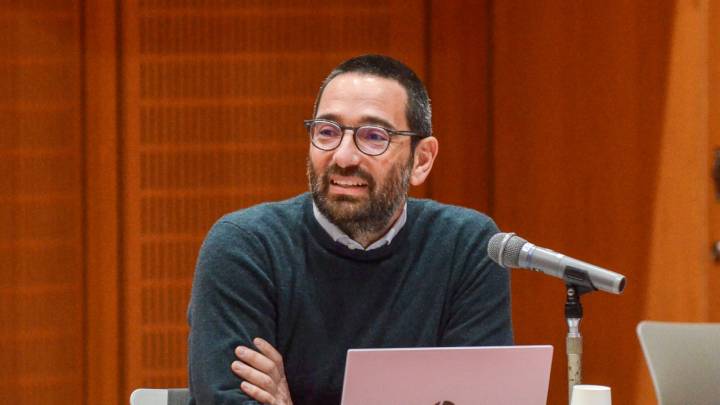
Lorenzo Guadagno, Programme Manager, Platform on Disaster Displacement
Irene Schöfberger and Salma Hazem Nooh, both previously with Global Migration Data Analysis Centre, International Organization for Migration (IOM), presented their chapter on “Humanitarian Programming on Child Migration in Northern Africa and Southern Europe: The Role of Data.” They noted that as of 2020, an estimated 35.5 million international child migrants existed worldwide, yet data collection on their experiences remains limited. Their research identified major challenges in data collection, including outdated censuses, limited age- and sex-disaggregated data, difficulties in accessing child migrants, and varying definitions of childhood.
To address these gaps, they highlighted initiatives such as the International Data Alliance for Children on the Move (IDAC) and UNICEF’s ethical research guidelines. Their case study, based on data and interviews with humanitarian actors, demonstrated that despite some strengths, data gaps affect programming, advocacy, and fundraising, making it harder to provide targeted support for child migrants.

Salma Hazem Nooh, previously with Global Migration Data Analysis Centre, International Organization for Migration

Irene Schöfberger, previously with Global Migration Data Analysis Centre, International Organization for Migration
Nikki Herwanger and Alexandra Bate from the IOM Displacement Tracking Matrix presented their chapter, “Representative Humanitarian Data Collection: Female Participation for Better Data on Migration and Internal Displacement.”
The study examined gender disparities in humanitarian data collection and how these impact data content, quality and accuracy. Their research across Haiti, Lebanon, South Sudan, Sudan, and Ethiopia found that female participation in data collection is often hindered by structural barriers, including social norms, safety risks, and lack of access to information.
Their findings underscored the need for recruitment strategies that promote gender parity, as well as multipronged approach to engage key female informants in data collection efforts.

Nikki Herwanger, Displacement Tracking Matrix. International Organization for Migration

Alexandra Bate, Displacement Tracking Matrix, International Organization for Migration
Oliver Neuschaefer, Christian Blind Mission and Louisa Yasukawa, previously with the Internal Displacement Monitoring Centre and UNHCR, presented their chapter, “From Policy to Practice: The Evolution of Disability‑Inclusive Humanitarian Action on Internal Displacement in Vanuatu and Nigeria.” Using case studies from Vanuatu and Nigeria, they examined how international frameworks such as the UN Convention on the Rights of Persons with Disabilities and the Sendai Framework for Disaster Risk Reduction translate into practice.
In Vanuatu, recent policy changes have led to improved accessibility measures in disaster response efforts. However, challenges remain, including meaningful participation of people with disabilities in decision-making.
In Nigeria, the study found that disability inclusion has gained prominence in humanitarian response plans, but attitudinal barriers persist. Their research emphasized the importance of collecting both quantitative and qualitative data to understand the intersectional challenges faced by displaced persons with disabilities.

Oliver Neuschaefer, Christian Blind Mission
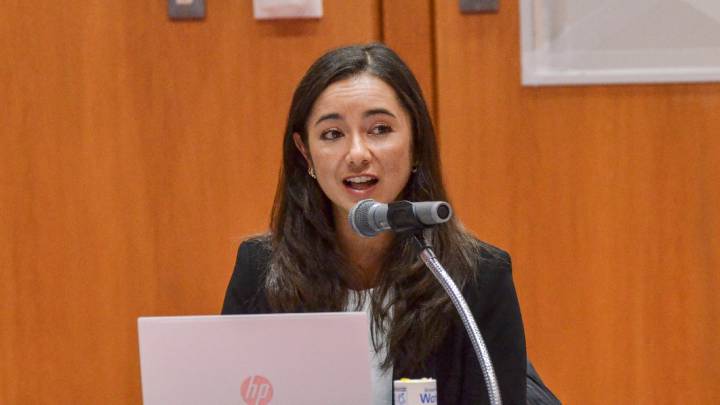
Louisa Yasukawa, previously with the Internal Displacement Monitoring Centre and UNHCR
Lisette R. Robles, Visiting Fellow, JICA Ogata Research Institute, presented the chapter, co-authored with Rogie Royce Carandang, titled “Inclusion of Displaced Older People in Research and Practice: Insights on Humanitarian Action for Older Filipinos.” Although older people represent a smaller proportion of displaced populations, their numbers are increasing due to prolonged displacement situations. Older people often serve as caregivers while also requiring support themselves, creating additional complexities.
The study examined the invisibility of older Filipinos in humanitarian responses, pointing out gaps in data collection and service provision. The chapter calls for a shift in humanitarian policies to engage with older people to recognize and address their evolving needs and capacities.
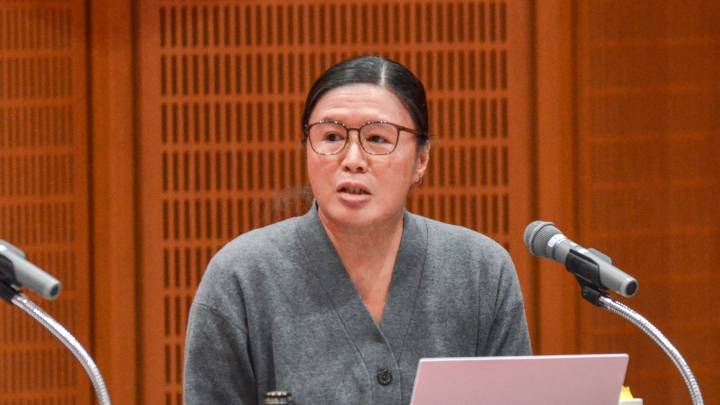
Lisette R. Robles, Visiting Fellow, JICA Ogata Research Institute
Takeuchi Kaito, Research Fellow, JICA Ogata Research Institute, discussed the chapter, co-authored with Hata Tatsuya, called “Protecting Forced Migrant Workers: A Case Study of Rescue Operations for Fishermen Trafficked from Thailand to Indonesia.” The research examined large-scale counter-trafficking operations that rescued over 3,000 trafficked fishermen between 2014 and 2016.
Takeuchi highlighted the complexities of identifying and assisting trafficked migrant workers, many of whom lacked documentation. The study findings emphasized the four Ps of prevention, protection, prosecution, and partnership, with the need for improved coordination among governments, NGOs, and international organizations to enhance victim protection, repatriation, and reintegration efforts.
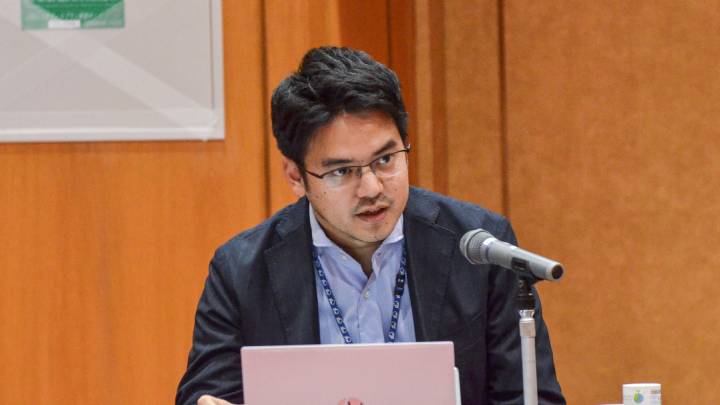
Takeuchi Kaito, Research Fellow, JICA Ogata Research Institute
Completing the book launch seminar is the reflection from a development perspective on the increasing and protracted nature of forced displacement by Oi Ayako, Senior Director, Office for Peacebuilding, Governance and Peacebuilding Department, JICA. She outlined JICA’s approach to peacebuilding, which integrates human security principles with the humanitarian-development-peace nexus. She presented JICA’s unique inclusive participatory planning approach in Refugee Camps in the West Bank, Palestine, which involves displaced communities in decision-making processes. She articulated the importance of meaningful participation of vulnerable groups and capacity building in forced displacement settings.

Oi Ayako, Senior Director, Office for Peacebuilding, Governance and Peacebuilding Department, JICA
Following the presentations, speakers responded to questions from the audience and active discussion ensued.
The seminar program can be found here.
A video recording of this seminar can be watched from the link below.

事業事前評価表(地球規模課題対応国際科学技術協力(SATREPS)).国際協力機構 地球環境部 . 防災第一チーム. 1.案件名.国 名: フィリピン共和国.

事業事前評価表(地球規模課題対応国際科学技術協力(SATREPS)).国際協力機構 地球環境部 . 防災第一チーム. 1.案件名.国 名: フィリピン共和国.

事業事前評価表(地球規模課題対応国際科学技術協力(SATREPS)).国際協力機構 地球環境部 . 防災第一チーム. 1.案件名.国 名: フィリピン共和国.

事業事前評価表(地球規模課題対応国際科学技術協力(SATREPS)).国際協力機構 地球環境部 . 防災第一チーム. 1.案件名.国 名: フィリピン共和国.

事業事前評価表(地球規模課題対応国際科学技術協力(SATREPS)).国際協力機構 地球環境部 . 防災第一チーム. 1.案件名.国 名: フィリピン共和国.